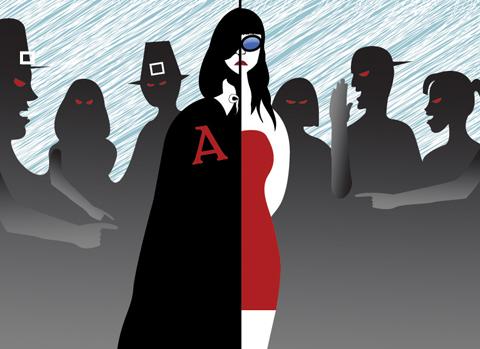Women are sexual objects, put on display for voyeuristic consumption in a society that still finds the ideas of housewives and white picket fences endearing.
America is a land of paradoxes where women are expected to achieve unrealistic standards of beauty in order to be desired, yet vilified when they use their sex as a powerful weapon only they can control. It is a duality that the female gender has yet to escape.
This contradictory fantasy has evolved into what can be called “slut-shaming.” Hardly a new phenomenon, slut-shaming is the act of judging and demeaning women for their sexual choices, or even the assumption of sexual promiscuity. It is a way to attach importance and integrity to a woman’s sexuality; something that is rarely connected to men and their sexual choices.
Slut-shaming tells us that women are defined by their sexuality, regardless of the decisions they make or the personal values they hold. For women who have been judged for having multiple sexual partners, for wearing a low-cut or tight shirt, or for even taking the infamous “walk of shame,” slut-shaming was at work.
For Renee Clift, Fresno City College professor of Women’s Studies, this degradation of women is anything but surprising.
“A woman’s sexuality is definitely connected to her value. Oh, absolutely. And not so with men,” she said. “I suppose historically a woman’s role was to bear children and to continue producing children. Sexual expression was a part of attracting a mate, but of course that’s been contorted and degraded in our current culture.”
Slut-shaming is an aggressive way to demean and oppress women in society: it is a dangerous tool to divide women as a community and establish the female form as nothing more than property we have no right to own.
“There’s been a move away from the collective, far more toward the individual.” Clift said.
The role of feminism in mainstream society has lost its strength. It has been eroded after decades of media sexualization.
Terms like “slut” and “whore” are dangerous because they attack women for doing what they want with their bodies. In essence, slut-shaming criticizes women for having authority over their own bodies.
So if the misogynistic, objectifying treatment of women is based on a historically patriarchal cultural foundation, what are we supposed to do to counteract this seldom-questioned injustice?
Particpation in Slut Walk is one solution. Born in Toronto in 2011 amid anger and discontent, Slut Walk is a social protest in which individuals are urged to dress in “slutty” attire to revolt against the concept that women are responsible for the negativity they endure both physically and socially.
Slut Walk is now a worldwide phenomenon, with protests occurring in locations as far and wide as Delhi, India and Berlin, Germany.
As Clift stated in regards to Slut Walk, “For someone to make a speech, to get press attention, and to be able to explain that that is one of the motivations, there’s an aspect of sarcasm to that, and that is one of the most beautiful forms of the social protest.”
If Slut Walk is a social protest on a monumental scale, then we can all protest with more subtlety on a daily basis. Think about the words you use, think about the way you view women, and think about the role you play in an exploitative culture. If taking responsibility for what you choose to do with your body makes you a slut, then what does that make me?







